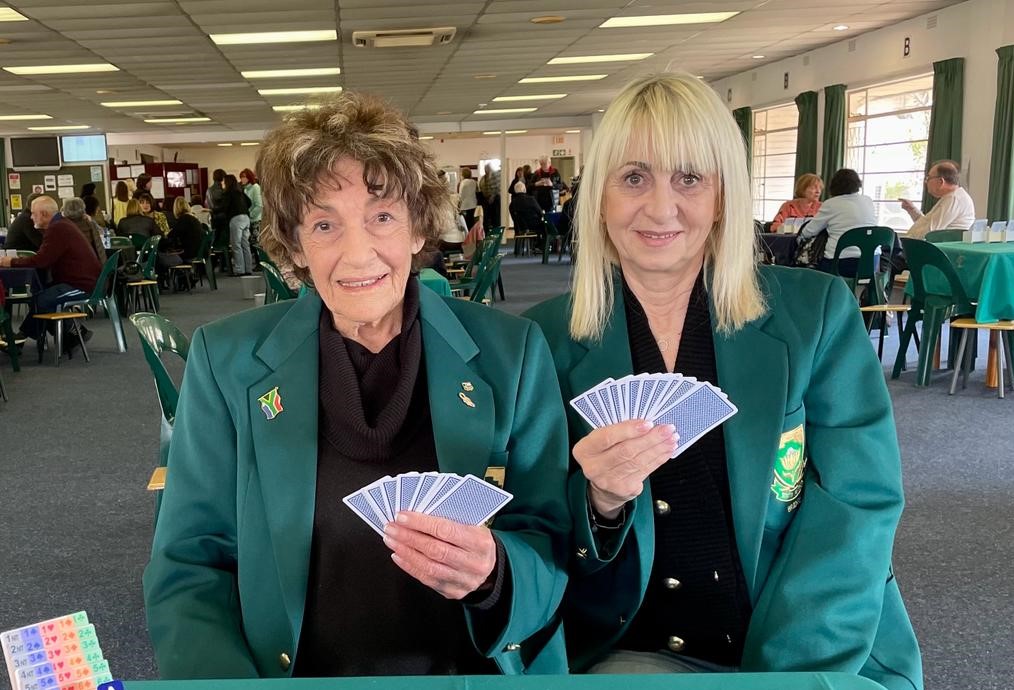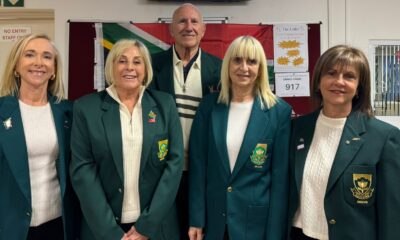
Sport

Cup runneth over for mighty duo in Morocco
Johannesburg octogenarian Roz Bernstein and her younger bridge partner, Sharon Lang, are heading to Morocco next month in the hope of becoming the first South Africans to win the Venice Cup at the biennial World Bridge Team Championships.
The 84-year-old Bernstein, who works as a bookkeeper, and her fellow former teacher, Lang, are two Jewish players in a South African team of six that will represent the country at the Cup, which is taking place in Africa for the first time.
The championship is being held at the luxurious Mövenpick Mansour Eddahbi Palais des Congrès Marrakech Hotel in Marrakesh, Morocco, from 20 August to 2 September.
South Africa’s three pairs, one being Bernstein and Lang, will each play an equal number of the three two-hour matches that the team will play on each day for seven days.
Eight countries qualify for the knockout stages after the seven days. “It’s a bit like a soccer league where they have a round robin and then quarterfinals, semifinals, and finals,” Lang says.
Morocco, as the host nation, as well as South Africa and Egypt will be three of the 22 countries from across the world at the championship.
The winning country will lift the prestigious Venice Cup trophy, which has been awarded to the winners on 22 occasions since the first edition in 1974 in Venice. The Bermuda Bowl is awarded to the winners of the open event and the d’Orsi Senior Bowl is awarded to the winners of the seniors’ event.
Bernstein competed at two previous championships, in Shanghai and Bali, and Lang is gearing up for her debut at the tournament. The pair made the South African team for the 2020 championship in Italy, but it was cancelled due to the COVID-19 pandemic.
Lang and Bernstein, who have been playing together since 2015, played in two sets of trials, first to qualify for the South African Ladies Team in February, and then to qualify as one of the two countries to represent Africa at this year’s championships.
In the latter trials, they came up against Morocco, Tunisia, Egypt, Kenya, and Réunion in June. “We played against those countries online, as has been the case since the onset of the pandemic, but monitored at the bridge club in Linksfield,” Bernstein says.
At the championship, the players will be seated at tables in a very large hall, Lang says. “It’s quite strict. The players will be subject to drug testing and won’t be able to eat or smoke inside the venue. No cellphones are allowed either.”
Bernstein and Lang have been “very successful” as a pair, the former says. “We’ve won three out of the four times we’ve participated in the trials for the South African team – in 2017, 2020, and this year. Before the pandemic, we played mainly at the club. Now, we play probably three or four nights a week online and once a week at the local bridge club.”
Bernstein’s late husband, Michael, was a good bridge player and taught her how to play the game in 1960, the year they got married. “We played a lot together, although not as partners. It takes a long time before you really play serious bridge. At that stage, I was young and I had children. I would say I probably started playing seriously in 1980. After Michael passed away, it became more important for me to play.”
Lang started playing the game seriously in 2000 after working as a secondary school French teacher for 10 years. “When I stopped teaching, I became a desperate housewife and was bored, so I took up bridge to be able to socialise with my friends and keep myself amused and stimulated. I found it very difficult in the beginning because I hadn’t studied since university and it was difficult to retain the knowledge. But it’s become easier as I’ve gone along. It’s certainly a game that wakes your senses.”
Lang has “tremendous admiration” for Bernstein. “She’s the most phenomenal person in terms of stamina and the knowledge she maintains. She’s older than me, but by the way she conducts her life, you wouldn’t think so.”
Bernstein says she doesn’t feel her age. “I’ve just carried on playing and fortunately, I’ve been able to. I’ve put a lot of effort in. One has to at this level.”
She says the game has “progressed enormously” over the years. “It has become a science almost. It’s just not the same game that I started learning 60 years ago.”
Lang says you learn a lot about yourself as a bridge player – how competitive you really are, and how resilient you are, “because there are a lot of disappointments in bridge, and you have to learn how to handle them”.
Bridge is a game you never master, Bernstein says. “However good you get, you’re always learning and there’s always someone better. You can play it for fun. You can enjoy it at any level. That’s what’s incredible about the game. You can play it as you wish. When you take it seriously, you need to put a lot of effort in, work with your partner, and have stamina.”
She says team spirit is important. “We’ve realised over the years that the best team doesn’t always consist of the best players. It consists of the most harmonious mix of people.”
It’s crucial to find a “congenial” partner, she says. “They don’t have to be your best friend, but you need to have some kind of rapport with them at the table.”
Playing bridge gives you “a massive social passport in terms of meeting people in your own city and from overseas,” Bernstein says. “Somehow, you just know somebody wherever you go. Bridge is such a such a worldwide preoccupation.”










